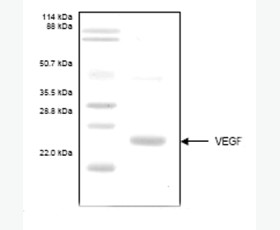Recombinant Human Astrocytic Phosphoprotein PEA-15/PEA15
| Product name: | Recombinant Human Astrocytic Phosphoprotein PEA-15/PEA15 |
| Source: | E. coli |
| Purity: | Greater than 95% as determined by reducing SDS-PAGE. |
| Buffer Formulation: | Lyophilized from a 0.2 μm filtered solution of 20mM PB,150mM NaCl,pH7.4. |
| Applications: | Applications:SDS-PAGE; WB; ELISA; IP. |
| Storage: | Avoid repeated freeze/thaw cycles. Store at 2-8 oC for one month. Aliquot and store at -80 oC for 12 months. |
| UOM: | 100ug/50ug/200ug/1mg/1g |
| Source | E. coli |
| Description | Recombinant Human Astrocytic Phosphoprotein PEA-15 is produced by our E.coli expression system and the target gene encoding Met1-Ala130 is expressed. |
| Names | Astrocytic Phosphoprotein PEA-15, 15 kDa Phosphoprotein Enriched in Astrocytes, Phosphoprotein Enriched in Diabetes, PED, PEA15 |
| Accession # | Q15121 |
| Formulation | Lyophilized from a 0.2 μm filtered solution of 20mM PB,150mM NaCl,pH7.4. |
| Shipping |
The product is shipped at ambient temperature. |
| Reconstitution |
Always centrifuge tubes before opening. Do not mix by vortex or pipetting. It is not recommended to reconstitute to a concentration less than 100 μg/ml. Dissolve the lyophilized protein in ddH2O. Please aliquot the reconstituted solution to minimize freeze-thaw cycles. |
| Storage |
Lyophilized protein should be stored at < -20°C, though stable at room temperature for 3 weeks. Reconstituted protein solution can be stored at 4-7°C for 2-7 days. Aliquots of reconstituted samples are stable at < -20°C for 3 months. |
| Purity |
Greater than 95% as determined by reducing SDS-PAGE. |
| Endotoxin | Less than 0.1 ng/µg (1 IEU/µg) as determined by LAL test. |
| Amino Acid Sequence |
GSHMAEYGTLLQDLTNNITLEDLEQLKSACKEDIPSEKSEEITTGSAWFSFLESHNKLDKDNLSY IEHIFEISRRPDLLTMVVDYRTRVLKISEEDELDTKLTRIPSAKKYKDIIRQPSEEEIIKLAPPP KKA
|
| Background | Astrocyticphosphoprotein PEA-15 (PEA15) is a death effector domain (DED)-containing protein. PEA15 is mainly expressed in the central nervous system, principally in astrocytes. Increased PEA15 levels affect tumorigenesis and cancer progression. PEA15 is overexpressed in breast cancers and gliomas as well as in type 2 diabetes. PEA15 blocks Ras-mediated inhibition of integrin activation and modulates the ERK MAP kinase cascade. PEA15 also inhibits RPS6KA3 activities by holding it in the cytoplasm. In addition, PEA15 inhibits both TNFRSF6 and TNFRSF1A mediated CASP8 activity and apoptosis. At present, PEA15 expression is also a significant prognostic marker in ovarian cancer. |














